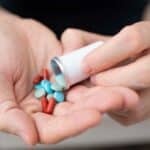- Method Of Action
- Treatment Cases
- Different Formulations
- Different Abuse Potential
- Side Effects
- Precautions & Warnings
Dexedrine and Desoxyn are two potent brand name stimulant medications prescribed to treat attention deficit hyperactivity disorder and other conditions.
While they share many similarities, key differences in the properties of these medications have resulted in Dexedrine being considered a first-line treatment option, while Desoxyn is less common and reserved for second-line use.
Comparable Method Of Action
Both Desoxyn (methamphetamine hydrochloride) and Dexedrine (dextroamphetamine) are central nervous system (CNS) stimulants that influence monoamine transporters and increase a person’s neurotransmitter levels.
When an adult or juvenile with ADHD experiences a controlled increase in dopamine, norepinephrine, and serotonin levels, it tends to improve their mental clarity, impulsivity, and concentration. Long-term therapy with stimulant medications can even help improve brain development in children with ADHD.
Methamphetamine, however, is known to have a more significant impact on serotonin reuptake relative to dextroamphetamine or norepinephrine, potentially resulting in a more balanced overall effect.
This may explain why some people respond to Desoxyn more positively than Dexedrine or Adderall.
Comparable Treatment Cases
Dextroamphetamine is a first-line treatment for adult ADHD, narcolepsy, and shift work sleep disorder.
It is prescribed either in its active form, Dexedrine, as a component of Adderall/Adderall XR (amphetamine salts), or through Vyvanse (lisdexamfetamine) which acts as prodrug and produces dextroamphetamine as the medication is metabolized.
The preferred ADHD medication for children is methylphenidate, found in medications including Ritalin, Concerta, Daytrana, Metadate, and others.
Non-stimulant ADHD meds, including atomoxetine, guanfacine, and clonidine, are prescribed cases in which a person does not respond to stimulant therapy, or prefers not to use stimulant medications.
Pharmaceutical methamphetamine is far purer and more controlled than street meth.
Nevertheless, it is reserved for cases in which a person, including both adults and children over the age of six, has explored other stimulant options, but they have not been effective or have caused unacceptable side effects.
It is also sometimes prescribed for severe obesity and used off-label to treat narcolepsy.
Different Formulations
Dexedrine comes in two forms:
- Dexedrine, immediate-release tablets which are effective for about 4-6 hours
- Dexedrine Spansule, an extended-release medication effective for 8-12 hours
- Desoxyn is available in immediate release tablets only, with effects that last up to 8 hours.
- Both drugs are available generically.
Different Abuse Potential
Dexedrine, Desoxyn, and other CNS stimulants used to treat ADHD are classified as schedule II controlled substances by the DEA and FDA. This means that they are all collectively known to have a high potential for abuse as well as physical or psychological dependence and addiction.
However, because of its chemical properties and effects on the body, Desoxyn is considered to have a substantially higher abuse potential than Dexedrine.
In its documentation, the FDA strongly urges healthcare professionals to carefully weigh the potential benefits of Desoxyn against the risks of its use, abuse, and diversion when prescribing it.
In practice, both drugs are abused in high doses to trigger stimulant highs, or taken for non-medical reasons, often to increase athletic or academic performance or aid in weight loss.
Shared Side Effects
As stimulant medications, both of these drugs are known to cause a variety of potential side effects:
- dry mouth
- nausea
- upset stomach
- cramps
- diarrhea
- constipation
- dizziness
- dry mouth
- weight loss
- trouble sleeping
- headaches
- nervousness
- loss of appetite
- sweating
- irritability
- restlessness
However, Desoxyn is often reported to be better tolerated and to generate fewer side effects than Dexedrine when taken by those with ADHD. This is thought to relate to differences in its neurochemical action when compared to other ADHD medications.
Similar Precautions & Warnings
Both Desoxyn and Dexedrine can cause adverse effects or interact with certain other drugs.
Before using either of these medications you should be aware of the following precautions:
- monoamine oxidase inhibitors (MAOIs) are potent antidepressants that should not be taken with Dexedrine or Desoxyn due to the risk of a serious or fatal drug interaction
- Desoxyn and Dexedrine may cause stroke, heart attack, or sudden death, primarily in those with heart problems including high blood pressure, irregular heart rhythm, coronary artery disease, heart failure, cardiomyopathy, or heart abnormalities
- Desoxyn and Dexedrine can exacerbate certain mental health conditions including bipolar disorder, depression, psychotic disorder, or suicidal thoughts
- Desoxyn and Dexedrine are prone to misuse and should be used with caution by those with personal or family history of substance use disorder
- Desoxyn and Dexedrine may exacerbate motor tics, seizures, or overactive thyroid conditions
- stimulant medications, including Desoxyn and Dexedrine, may temporarily slow the growth of children
- Desoxyn and Dexedrine should be avoided by women who are pregnant, planning to become pregnant, or who are breastfeeding
If you or a loved one struggle with prescription drug abuse, please contact us for information on our outpatient treatment programs.
Sources
Written by
Northeast Addition Editorial Team
©2024 Northeast Addition Center | All Rights Reserved
This page does not provide medical advice.





